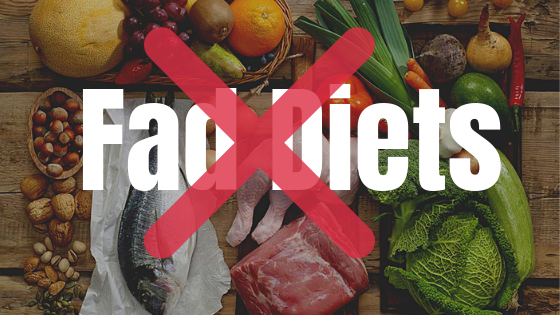The diet industry is a billion dollars filled of diet products and “quick fix” meal plans. With all the fad diets and quick fixes companies claim to offer, it can be confusing to know what will really work or what is a scam. To be blunt, diets actually don’t work. Ultra-restrictive and low-calorie diets can end up lashing back and, many times, result in binge eating and obsession with food.
While diets allow people to drop weight temporarily, the excessive restriction and lack of nutrients deprive your body and don’t typically teach you anything about changing your lifestyle. As a result, 80% of dieters regain any weight lost and even more after ending their diet plan. This leads to more frustration, guilt, and shame about your weight.
If you’ve been on every diet on the market and are still frustrated with your results, do not be discouraged. The problem is not you, the problem is the diet. To avoid being left with empty results, check out some of the claims that are often associated with fad diets:
Here are some ways to spot fad diets:
- Guarantees a certain amount of weight in a specific time range. A safe range of weight to lose is anywhere from ½ to 2 pounds per week. Expecting a program to have you lose 20 pounds in two weeks is not safe. If you do lose that much, it’s quite possible it was lean muscle loss, and not fat.
- Asks you to cut certain foods, food groups, or macronutrients (carbs, fat, or protein) out 100%. Unless you are following an elimination diet for medical necessity, digestive upset or food allergies, there is not a need to avoid any specific food groups. All food groups have different antioxidants, vitamins, and minerals that are beneficial to your health. It is understanding what foods in each food group are nutrient dense, less processed, and how much of them to eat for your caloric and/or medical needs that needs to be paid attention to.
- Says it is easy, miraculous, and there is no work involved. Bottom line- weight loss DOES take effort. It requires us to change our habits and pick up new ones.
- There is a supplement, patch or pill to “melt fat”. To date, there is no pill to melt fat or block calorie absorption. If there was such a quick fix, no one would have a weight problem. The majority of these over-the-counter products and “supplements” are scams with no supporting scientific research.
- The diet says you can eat as much as you want and whatever foods you want. Once again, you can’t expect to lose weight if you don’t change your lifestyle habits or food choices.
- “Finally, a weight loss formula for everyone!” A diet that claims to be perfect for all is erroneous. One-size-fits-all just doesn’t work. Your lifestyle habits and health concerns are unique. That’s why I opened JWFNS – to help you design your own personalized nutrition and exercise programs to suit your particular lifestyle.
- “Scientifically Proven!” or “Doctor endorsed!” Was this study conducted on a large group of people, or just a few rats in a lab? It’s important to know if this diet was repeatable with the same results on humans and on a large sample group.
- “Money-back guarantee!” It may make you feel safer to give the product a try, but realize that many companies do not follow through with this promise.
- “100% safe!” Just another to attempt to make more sales. Think of it this way – if there were no reason to doubt, why would they need to make this claim at all? Many products have been removed from the market due to safety issues, but not until too many lives were already destroyed or lost.
- “Celebrity Endorsed!” Just because you can recognize the actor or actress doesn’t make the product any more reliable. The actor is being paid to endorse the product, while you are paying to be scammed.
- “A miraculous breakthrough!” Turn and run the other direction, it IS probably too good to be true.
If you’re looking to change some of your eating habits, develop peace with food, and build sustainable nutrition habits, schedule an appointment with a Registered Dietitian at JWFNS – the food and nutrition experts!

